
Knowledge alliance for Social Innovation in Shrinking villages (KiNESIS) is a three-year project (2021-2023), co-funded by the Erasmus+ programme and coordinated by the University of Naples “L’ Orientale” in Italy.
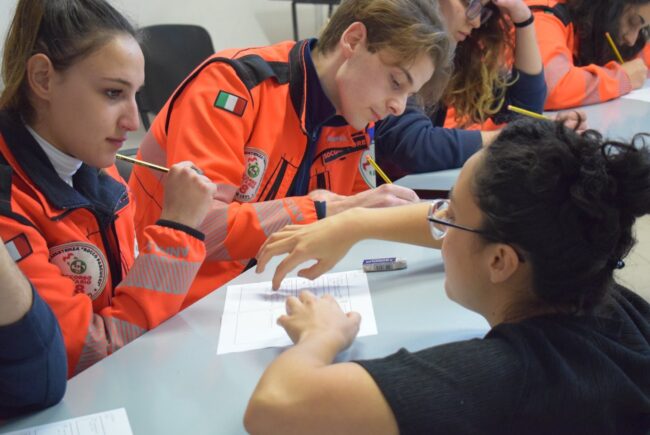
Daniela Chavarria, from the KiNESIS project, interviews young residents in Frigento, Italy. The programme broadened the residents' perspective on their experience of their community's decline.
Daniela Chavarria, from the KiNESIS project, interviews young residents in Frigento, Italy. The programme broadened the residents' perspective on their experience of their community's decline.
The KiNESIS project shows how research can change the course of rural shrinking. It also shows the value of real-life experience of students and the transformative power of communities.
Knowledge Exchange for Social Innovation in Shrinking Villages (KiNESIS) is a three-year initiative that creates ‘living labs’ to study rural shrinkage in Spain, Estonia, Germany, Italy and the Netherlands. Unlike traditional research methods, KiNESIS brings young researchers to rural areas, emphasising the value of real-life experience and underscoring the transformative power of community engagement in fighting against rural decline.
One of the women behind the idea for the student programme is Jacomien Kooiker, who alongside Johanna Monti of the University of Naples “L’Orientale” came up with it in 2015 and has helped develop the programme ever since. Kooiker is the founder of the Dutch foundation Group for European Development, which now is an important part of the international consortium of 13 partners running the KiNESIS programme.

“We want to shift the narrative of passivity in rural shrinking towards the empowerment,” says Jacomien Kooiker. Photo: Astrid Visser.
“As I worked in development work in Africa and India, we helped create close contacts between local and European students. This was always a good way of getting students acquainted with real-life problems. Thanks to this, I got the idea for the programme of connecting students’ and universities’ work with the fight against rural shrinking areas in Europe. This had never been done before on a larger scale, but I knew it had to be done like that,” Kooiker says.
Kooiker is now responsible for the training and mapping of new areas in the KiNESIS project. She also prepares the students before they travel to the project country.
All in all, the KiNESIS initiative demonstrates how research can change the course of rural shrinking and create life-long learning experiences for students. It also highlights the urgent need for community involvement in this process, inspiring a sense of collective responsibility.
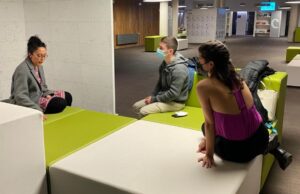
At the University of Navarra in Spain, Daniela Chavarria (left) is preparing the students Luca Scavuzzo and Paola Buonanno for their internship in Frigento. Photo: Jacomien Kooiker
The feedback from students has been positive.
“In university, we are used to gathering information with the help of questionnaires and interviews. However, not everyone talks about the importance of giving back to the community and working with them. It creates much more engagement and enriches the research and your experience as a researcher,” says Miranda Colavolpe, one of over 50 students who have participated in the KiNESIS programme.
Rural shrinking is a pressing issue in European rural development policy. According to the final report of ESCAPE European Shrinking Rural Areas: Challenges, Actions and Perspectives for Territorial Governance (ESPON, 2020), not all regions depopulate for the same reason and at the same scale. This underscores the need for tailor-made responses and approaches to fit the needs and specificities of each region or affected area.
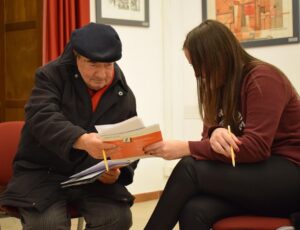
Chantal van der Sluijs from Hanze University of Applied Sciences in Groningen, the Netherlands, interviews a local man in Frigento.
However, local inhabitants and governments often face difficulties in finding a way to change their ways to solve the problem. In most areas, alongside shrinkage, communities also face ageing and younger generations leaving the area.
In most scenarios, these factors deteriorate the conditions for livelihood and attractiveness, both for locals and newcomers. This is why one of the policy recommendations within the latest ESPON report (2017) is to improve comparative research within shrinking regions. This comparison might shed some light on local issues within similar European scenarios, offering potential solutions and strategies.
Motivated by these reports and their ideas, the Erasmus-funded KiNESIS project and its 13 stakeholders designed a student exchange programme, including the placement of living labs in shrinking areas.
“The programme has three fundamental ideas,” Kooiker explains. “First, it aims to bring young people’s perspective to the shrinking areas. It is important to listen to the voice of the young residents who have left and to use fresh eyes to address the local issues.”
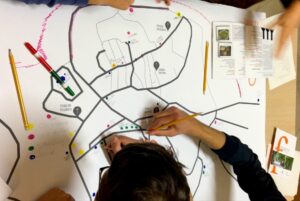
Daniela Chavarria draws a map of the area in cooperation with locals in Frigento. Photo: Johanna Monti.
As a second idea, she mentions collaboration.
“The programme enhances the collaboration between researchers and local communities to co-create practical solutions to problems related to rural shrinking.”
With that, Kooiker continues, locals are enabled to renew their perspectives while, at the same time, providing valuable insights and ideas for the research projects.
Collaboration between researchers and local communities create practical solutions to problems.
The third idea shifts the focus to collaboration between academia and policymakers.
“Addressing the issue in collaboration with locals allows students to understand the phenomenon more clearly and to break down the negative affirmations related to shrinkage and community self-esteem. That had previously hindered acting against the problem. A living lab aims to understand communities as a laboratory, closing the gap between academia and local policymakers,” she says.
In autumn 2024, by the end of the project, the stakeholders sat down to evaluate the pros and cons of the programme. It was important to reflect on the outcomes of students who had actively participated in the community and conducted research in real-life settings. One conclusion was that the approach had allowed students and universities to foster both their research and social impact crucial for addressing shrinkage.
“People in shrinking villages were involved in the programme from the very beginning. They realised that their opinions mattered, that their heritage is unique, and that it is something to be proud of,” Kooiker says.

Frigento, Italy.
The programme also significantly widened the communities’ perspective on their experience of shrinking. In many villages, community members had an opportunity to actively interact with students from all over the world, with many new ideas, and come up with new ideas together.
“The local people realised that their village is good enough for students to do their research, which created a good foundation for developing new ideas for the future. The interaction between students and the local community worked out well.”
According to Kooiker, a key outcome of the programme was to analyse not only the problems but also the opportunities and capacities to change the reality of shrinkage.
Moving forward, the KiNESIS initiative expects to expand its impact to other similar European territories, such as Palaiochora in southwest Crete, Greece, and remote parts of Ireland, such as Ballinasloe in the west. Meanwhile, in the areas already involved in the project, participants are deepening their work.
KiNESIS aspires to become a model for similar projects, either at the academic level or in the policy-making scheme. It wants to shift the narrative of passivity and victimisation in rural decline towards the empowerment of communities through collaborative work and real-life case studies of students and researchers.
Read more on the experiences of the students here.
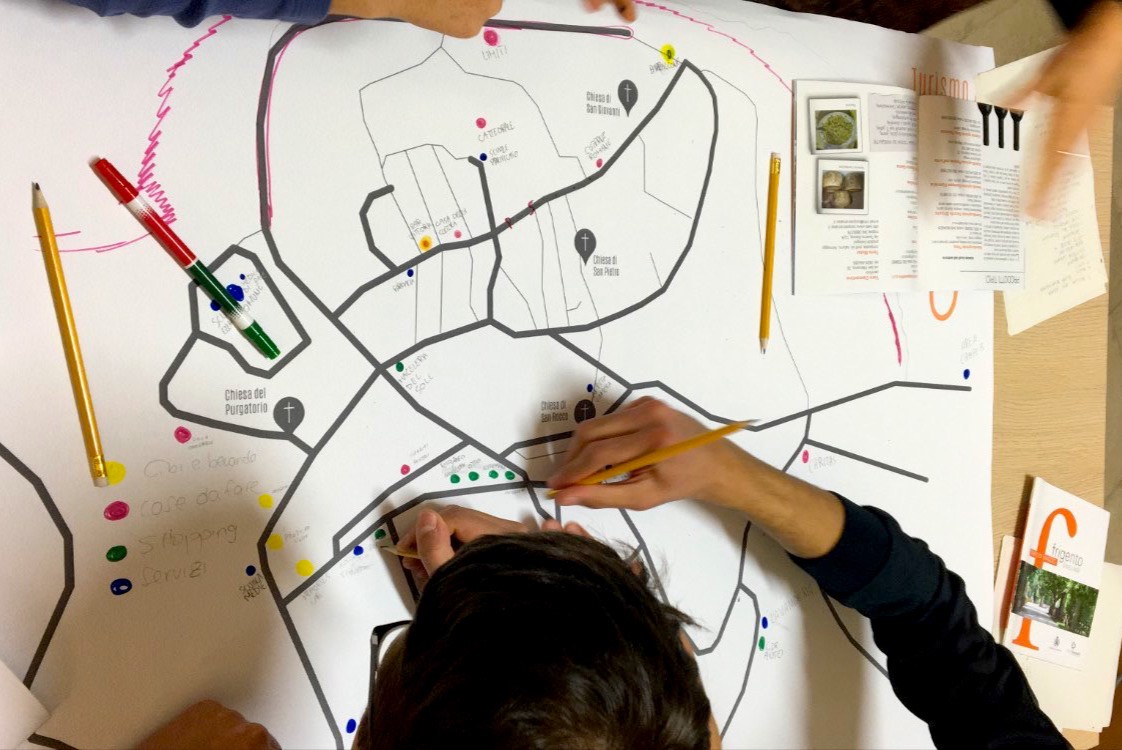
This article is part of the theme 'Research and Practice 2025'.
Read related articles here